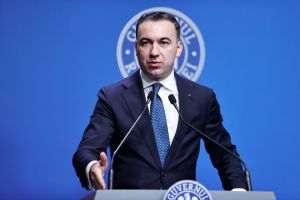The situation of the excessive budget deficit that our country registers, the fulfillment of the conditions for the approval of payment request number 3 from the National Recovery and Resilience Plan, the nomination of the future Romanian European Commissioner and the portfolio that he would hold, are the main topics of the discussion on which today Prime Minister Marcel Ciolacu will have in Brussels with Ursula von der Leyen, the president of the European Commission, in the presence of the Minister of Finance - Marcel Boloş - and the Minister of Investments and European Projects - Adrian Câciu.
Regarding the trip to Brussels, Prime Minister Marcel Ciolacu said yesterday, at the beginning of the government meeting: "We will discuss the status of the PNRR, together with the Minister of Investments and European Projects and the Minister of Finance. We will also analyze the latest developments regarding Payment Request 3, specifically, the situations related to the management of state energy and transport companies. Obviously, I will also discuss Romania's portfolio in the future European Commission with Madam President (ed. - Ursula von der Leyen). After this discussion, I will send the nomination of the future European Commissioner from Romania".
Prime Minister Marcel Ciolacu's visit to Brussels comes at a critical moment for our country, considering the financial situation - at the end of the first semester the budget deficit reached 63.67 billion lei, i.e. 3.6% of the Gross Domestic Product - and the commitments assumed towards the European Union. The meeting with the president of the European Commission, Ursula von der Leyen, is seen as an effort to negotiate a way out of the current impasse related to the budget deficit and to ensure the continuity of European funding, which is essential for the country's development.
Regarding the budget deficit, which has grown alarmingly in recent years, the European Commission has asked the Ciolacu government to implement a series of structural reforms, including increasing VAT, eliminating reduced VAT rates and introducing stricter SME taxation measures and multinationals. These measures are intended to bring Romania's budget into sustainable parameters and to respect the limits agreed in the framework of the National Recovery and Resilience Plan.
Among the measures that the Ciolacu government brought to public debate are:
• Increasing the VAT to 19% for all products and services, eliminating the reduced rates that are currently applied to certain categories of goods, such as food and tourist services.
• Progressive taxation and increased taxes on dividends and large incomes, a measure that would particularly affect the IT sector and employees in high-paying industries.
• Reform of pensions and the unitary wage system, which are essential for the long-term stability of public finances.
Prime Minister Marcel Ciolacu's objective for the meeting with Ursula von der Leyen is to negotiate a flexibility of the European Commission's requirements in relation to the budget deficit. The government is seeking to obtain an extension of the deadlines for the implementation of the reforms and to avoid the most drastic measures that could have a negative impact on the national economy. In addition, Ciolacu tries to ensure the continuity of the flows of European funds, which are essential for the financing of public investments and infrastructure projects.
In addition to the discussions related to the budget deficit, another central point on the agenda of the visit is the nomination of a new European commissioner from Romania. This decision is important for maintaining Romania's influence within the European Union, especially at a time when the country is facing internal economic and political challenges.
Victor Negrescu, European deputy from the PSD, is one of the names circulated for this position, and the final decision will have implications on how Romania will be represented at the European level. Marcel Ciolacu stated that our country should get a portfolio related to the economy, but sources within the Commission told Politico.eu that, if Romania is not given the requested portfolio, it could get the portfolio from politics of cohesion or transport - which he also held through Corina Creţu and Adina Vălean -, or the portfolio regarding EU expansion through the prism of the interest of the authorities in Bucharest for the Republic of Moldova to be integrated more quickly into the community bloc.
Regarding the approval of the payment request number 3 of the PNRR, in the amount of 2.7 billion euros, the officials in Brussels do not yet agree with the unblocking of the payment because the central authorities in Bucharest have not yet operationalized the Agency for Performance Monitoring and Evaluation Public Enterprises (AMEPIP), which should supervise state companies and ensure that they comply with corporate governance. In relation to AMEPIP, the initial procedure for operationalizing it by recruiting the management team was flawed by the candidates that the PSD-PNL governing coalition wanted to impose, a fact found by the European Commission and which forced the resignation of the entire management of the agency.
We remind you that, in addition to request number 3, the Government should also have sent request number 4 for payment this year, in the amount of 2.7 billion euros, but for the approval of which one of the milestones - the salary reform in the budget sector - has not yet been was fulfilled, because the respective draft law has not yet been drawn up and put to public debate by the Ministry of Labor and Social Solidarity.






























































